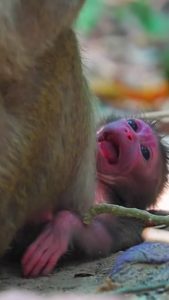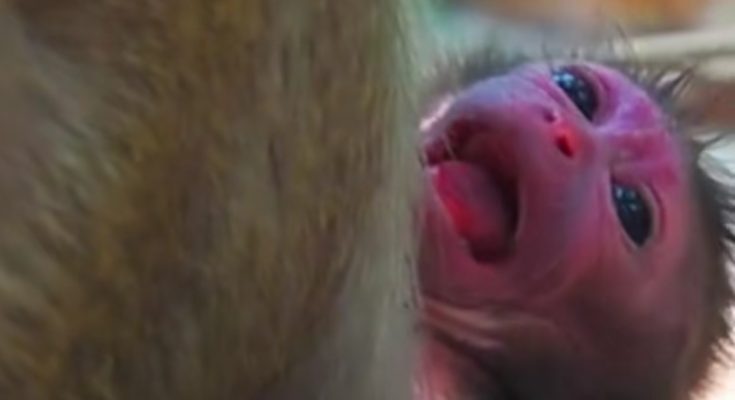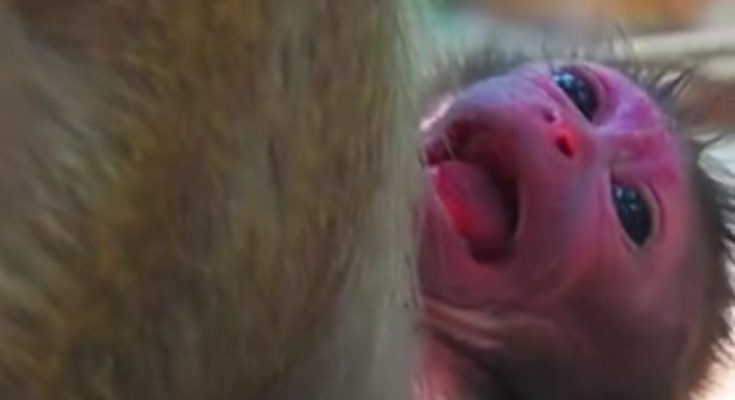
Why This Monkey Not Take Care Her Little Newborn
In the green heart of the forest, life often moved in gentle cycles—birth, play, growth, and the endless search for food. Yet beneath this rhythm, moments of tragedy sometimes unfolded, moments that left even the forest itself silent. One such moment was the story of a tiny newborn monkey, left behind by its own mother, its cries echoing into the emptiness of branches and leaves. And the question hung painfully in the air: Why did this monkey not take care of her little newborn?
The newborn had come into the world weak but alive, its small body trembling, its voice high and thin. Its eyes were barely open, struggling to adjust to the brightness of daylight. Instinct told it to cling, to hold on to the warm fur of its mother, to find safety in her arms. For a moment, it did—nestled close, carried by her heartbeat. But too soon, that comfort disappeared. The mother shifted away, her arms no longer cradling, her body turning cold and distant.
The baby cried, calling for her. Its tiny hands reached out desperately, fingers curling toward her tail, her fur, anything that could bring it close again. But the mother stepped aside, her gaze turned elsewhere, her face unreadable. The little one tumbled onto the ground, where the soil was damp and unkind. Its soft body hit the earth with a small thud, and though it was not enough to break bones, it broke the sense of belonging that should have been unshakable.
Why had she done this?
Some whispered that the mother was too young herself, barely grown, unready for the burden of caring for another life. Her instincts were confused, her heart not yet ripened by patience. She looked at the tiny creature not with tenderness but with uncertainty, perhaps even fear. To her, the cries were not calls of love but noises that unsettled her already fragile spirit.
Others believed it was weakness. The mother’s body was thin, her fur ragged, her energy consumed by the harsh struggle of survival. Food was scarce, predators watched from the shadows, and her own strength was too fragile to bear the weight of motherhood. In her tired eyes, perhaps the baby was not a blessing but another mouth she could not feed, another life she could not protect. So she left it, not from cruelty but from despair.
Still, there were moments that made the scene even harder to understand. The baby continued to cry, its voice trembling in the air like a fragile note of music. It stretched toward her, clinging when she passed close, pressing its tiny face into her fur with the hope of comfort. And yet, she pushed it away. She peeled its fingers from her arms and set it down again, leaving it to tremble on the ground. The forest, watching silently, seemed to ask the same aching question: Why?
The newborn’s suffering was unbearable to witness. Its chest rose and fell rapidly, its eyes glistened with tears, and its body shivered each time the breeze brushed over its thin fur. It tried to crawl after her, stumbling clumsily, only to collapse in exhaustion. Yet even in its weakness, it never stopped trying. That was the cruelest part—its love was endless, even when her care was absent.
Perhaps the mother’s heart was torn in ways unseen. Maybe she carried wounds from her own past, abandoned once by her own mother, leaving her with no memory of how to nurture. Or perhaps instinct had failed her, a cruel twist of nature that sometimes left mothers without the bond that should come naturally.
The forest floor bore witness to the scene of innocence and neglect. The baby whimpered softly, curling into itself for warmth. Ants crawled near, curious but uncaring. Birds chirped above, their melodies harsh against the silence of sorrow below. The mother sat a distance away, grooming herself, eating leaves, her eyes barely glancing at the tiny body only steps from her. It was as though she had turned her heart to stone.
And yet, deep inside, perhaps she knew. From time to time she looked back, her gaze lingering for just a moment before turning away. There was a flicker there—something like hesitation, something like regret. But still, she did not reach out. Still, she let the baby cry alone.
The question—why this monkey not take care her little newborn—was not one the forest could answer easily. Was it nature’s law, cruel and unbending? Was it survival, a mother choosing herself over a fragile life? Or was it a mistake, a flaw in her heart that left her unable to give what should have been given?
As the day wore on, the newborn grew weaker. Its cries came less often, its body slumped, drained of strength. The ground beneath it was unforgiving, and no warm arms came to lift it. Still, its tiny hands reached, even in weakness, toward the figure of its mother. The bond of love, though one-sided, remained unbroken in the heart of the baby.
The forest grew darker, shadows stretching as the sun began to set. The mother climbed higher into the trees, leaving her baby below. The little one whimpered faintly, eyes closing with exhaustion, the world slipping away. The sight was unbearable—innocence left without protection, a heart full of need unanswered.
And so the story ended not with resolution, but with silence. The question lingered like a wound: Why did she not care for her little one? The forest could not answer. The trees whispered in the wind, the animals turned away, but no one could explain the mystery of a mother who walked away from her child.
Perhaps there was no answer, only sorrow.
What remained was the image: a tiny newborn lying on the cold ground, frail and pitiful, and a mother turning her back. A story of love denied, of instinct broken, of a bond that should have been eternal but instead left the world with the most breaking heart.




